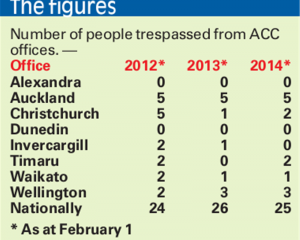Dr Louis Francescutti, who is travelling the country on behalf of ACC, says people see falls and other injuries as "freak accidents" and, as such, think nothing could have been done to prevent them.
"People have become habituated and desensitised to so much of it, it is part of life."
He is advocating a move to thinking of falls as no different from cancer or heart disease, with a similar approach needed to discovering the causes and finding solutions.
"It's a totally preventable disease."
Falls cost the economy "billions of dollars" each year. In 2010, 3000 people were off work for three months because of falls in their homes and ACC paid out $272 million for more than 260,000 injury claims in the same year.
In Dunedin alone, 3260 people were affected by falls in the home last year.
A unique system, ACC could benefit from a reorientation towards prevention, even a change of its name to incorporate injury prevention, Dr Francescutti, an emergency department physician and university academic, said.
"A simple change of name sets a whole new tone. A mind-shift change needs to be undertaken."
New Zealand and ACC was leading the way with its new falls campaign, Idea Nation, and competition calling on the public to come up with ideas to prevent falls around the home.
"This process is so cutting edge and innovative, I've not seen anything like it before."
With an international injury prevention conference in New Zealand in October, these ideas would get a worldwide audience, he said.
"It'll take the thinking to a whole different level. The rest of the world will follow."
If everyone took accidents seriously then the injury rate would plummet and "so much money would be saved you wouldn't know what to do with it".
There were simple things that could be done such as making people aware of the dangers, educating people and coming up with engineering solutions, including ensuring there were railings on both sides of stairs with light switches at the top and bottom of stairways and ensuring bathroom floors were non-slip.
Others were providing economic incentives such as ACC was doing with the falls competition and enforcement to ensure pproper adherencd to codes, he said.





